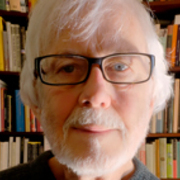
Ross Chambers
Ross Chambers arrived in New Zealand in the early 1970s from hometown Sydney. He was seeking a new way of life after training at the Australian Broadcasting Commission, and editing gigs on a range of TV dramas and documentaries (both freelance and for the ABC).
In NZ Chambers tried for work at the Government’s National Film Unit, where boss David Fowler was generous with his time, but made no job offers. Luckily he quickly found work with “grand old man” Stan Wemyss at Wellington production company Peach Wemyss Astor. At the time Wemyss was working hard to develop productions beyond the bread and butter TV commercials that were the company mainstay. When Wemyss secured funding from state television for pioneering te reo TV drama Uenuku, Chambers was tapped to cut both pictures and sound. Geoff Murphy directed.
After an extended rural idyll in the Wairarapa with goats and babies, Chambers returned to Wellington to both edit and sound edit Wild Man, the “riotously ridiculous” first feature from Murphy and the Acme Sausage Company. The film had grown out of a Blerta episode and Chambers remembers it as a personal favourite, “for sheer audacity, and I don’t just mean the production facilities cheekily scraped and scrounged.”
In 1977 Chambers became a public servant, engaged as the first Film Editor to officially work under that title at the National Film Unit (prior to then, NFU directors normally edited their own productions). The first task was setting up a small editing section for the NFU's “vast new premises” in the Hutt Valley, close to the Avalon TV Centre. Chambers recalls that “when Muldoon opened the joint we moved editing machines from floor to floor as he toured the premises, to make the place look fully occupied.”
After moonlighting as sound editor on 1982 comedy Carry Me Back, Chambers decided it was probably as good as time as any to go freelance. Local feature film production was in the midst of a major growth curve. Chambers joined the sound team on Geoff Murphy epic Utu then began a busy period working as sound editor or post production supervisor, including contributing to the atmospheric sound mix for classic child-and-the-elements tale Vigil, and supervising the completion of Leon Narbey’s Illustrious Energy. He also worked on mini-series Heart of the High Country.
In the mid 80s Ross relocated from Wellington to Auckland to become Post Production Supervisor at company Cinepro, run by ex sound man Don Reynolds. The company soon merged with Larry Parr's Mirage Entertainment, just in time to go belly up after the stockmarket crash.
Chambers returned to Sydney and began a period of screen work in both Wellington and Australia. He was one of the sound editors on Cannes-selected drama Crush and the Sam Neill presented Cinema of Unease, before his career moved towards its close in Miramar, working on two very ambitious projects involving Peter Jackson: Forgotten Silver and The Frighteners.
These days Chambers lives in retirement in the Blue Mountains near Sydney. He has fond memories of the generous opportunities offered by so many in the Kiwi film industry; and especially of “the originality and resourcefulness of those who built the renaissance of the film industry there”.